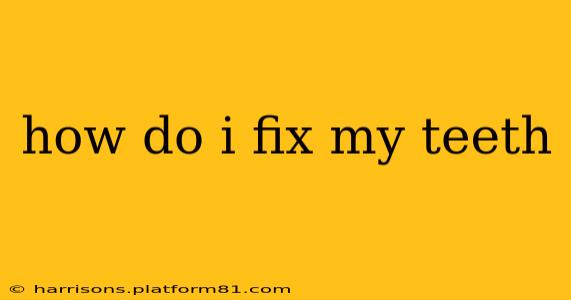A beautiful, healthy smile boosts confidence and overall well-being. But what if your teeth aren't quite up to par? Whether you're dealing with minor cosmetic concerns or significant dental issues, there are numerous ways to fix your teeth and achieve the smile you've always wanted. This guide explores various options, helping you understand the best approach for your specific needs.
What Kind of Dental Problems Do You Have?
Before exploring solutions, it's crucial to identify the specific dental problems you're facing. This will determine the most appropriate course of action. Common issues include:
- Cosmetic concerns: Discoloration, chipped teeth, gaps between teeth, slightly crooked teeth.
- Dental decay (cavities): Holes in the tooth enamel caused by bacteria.
- Gum disease (gingivitis or periodontitis): Inflammation and infection of the gums.
- Missing teeth: Teeth lost due to injury, decay, or gum disease.
- TMJ disorders: Problems with the temporomandibular joint (jaw joint).
- Teeth grinding (bruxism): Excessive clenching or grinding of teeth, often during sleep.
- Malocclusion (bad bite): Misalignment of the teeth and jaws.
How Can I Fix My Discolored Teeth?
Discolored teeth can be addressed through several methods:
- Teeth whitening: Professional in-office whitening provides dramatic results quickly. At-home whitening kits offer a more gradual approach. The effectiveness depends on the cause of discoloration.
- Dental bonding: A tooth-colored resin is applied to the surface of the teeth to cover stains or imperfections.
- Veneers: Thin porcelain shells are bonded to the front surface of the teeth, masking discoloration and improving the overall appearance.
How Can I Fix Chipped or Broken Teeth?
Depending on the severity of the chip or break:
- Dental bonding: Similar to its use for discoloration, bonding can repair minor chips and cracks.
- Dental crowns: A crown is a cap placed over the damaged tooth to restore its shape, strength, and appearance.
- Root canal treatment: If the damage extends to the tooth's pulp (nerve), a root canal may be necessary before a crown can be placed.
How Do I Fix Gaps Between My Teeth (Diastema)?
Gaps between teeth can be closed with various treatments:
- Orthodontics (braces or Invisalign): These gradually move teeth into proper alignment, closing gaps.
- Dental bonding: Small gaps can be filled with composite resin.
- Veneers: Veneers can cover gaps and improve the overall appearance of the teeth.
How Can I Fix Crooked Teeth?
Crooked teeth are often addressed through orthodontics:
- Braces: Traditional metal braces or clear ceramic braces gradually straighten teeth over time.
- Invisalign: Clear aligners are custom-made to progressively shift teeth into the desired position.
How Can I Fix Missing Teeth?
Several options exist for replacing missing teeth:
- Dental implants: Artificial tooth roots are surgically placed into the jawbone, providing a stable base for replacement teeth.
- Dental bridges: These consist of artificial teeth fused to crowns that are cemented onto adjacent teeth.
- Partial or full dentures: Removable appliances that replace missing teeth.
What About Gum Disease?
Gum disease requires professional treatment:
- Scaling and root planing: A deep cleaning procedure to remove plaque and tartar from below the gum line.
- Antibiotics: May be prescribed to combat infection.
- Gum surgery: In severe cases, surgery may be necessary to repair damaged gum tissue.
How Can I Fix My TMJ Disorder?
Treatment for TMJ disorders varies depending on the cause and severity:
- Mouth guards: Reduce stress on the jaw joint.
- Physical therapy: Exercises to improve jaw muscle function.
- Medication: Pain relievers and muscle relaxants.
- Surgery: In rare cases, surgery may be necessary.
How Can I Stop Teeth Grinding (Bruxism)?
Managing bruxism often involves:
- Mouth guards: Custom-made night guards protect teeth from wear and tear.
- Stress management techniques: Reducing stress can lessen teeth grinding.
- Medication: In some cases, medication may help relax jaw muscles.
What are the Costs Involved in Fixing My Teeth?
The cost of dental work varies significantly depending on the treatment needed, the location of the dentist, and the complexity of the procedure. It's essential to consult with your dentist for a personalized estimate. Many dental insurance plans cover at least some of the costs associated with restorative and preventative dental care. Payment plans and financing options are often available.
This guide provides a general overview. For personalized advice and treatment planning, it's crucial to consult with a qualified dentist. They can accurately diagnose your dental problems and recommend the most appropriate and effective treatment options for you. Remember, a healthy smile is a valuable investment in your overall health and well-being.
